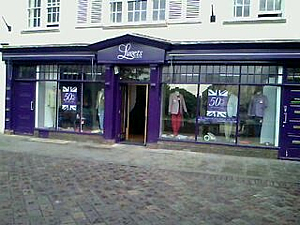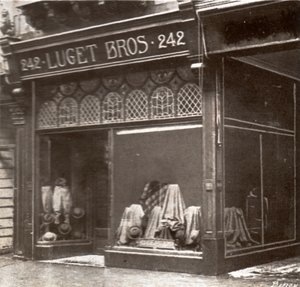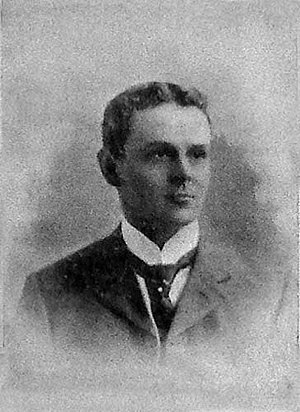
Lugets, 22 Cathedral Yard
Page added 6 October 2012
Return to Retail Exeter
Twelve years after Lugets relocated to Cathedral Yard from Castle Street, in 2000, many would think that the gents' outfitters has been facing the Cathedral for generations. The calm and elegant style epitomises their long involvement as a gents outfitters in the city.
The chimney sweep
Nothing is known of the origin of the Luget family in Exeter, other than they were probably Huguenots who fled France in the late Seventeenth Century. The first known Luget in our story appears in February 1806, when one James Luget married Anne Follett in St Sidwell. James’ career as a chimney sweep in Paris Street. An advert placed in the Exeter and Plymouth Gazette in 1842 stated that he was to introduce new chimney sweeping equipment, and that he would stop using 'climbing boys' by July, the next year. ln November 1846 his son, also named James, advertised that he was to continue his deceased parents trade.
James and Anne Luget had several other children, of which it was Samuel Follet Luget, born on 17 December 1817, who would be the one to enter the tailoring trade and establish the name of Luget with excellence.
Samuel's elder brother, John Follet (b 1810), was an established tailor, by 1839, at 73 Sidwell Street. John gained some notoriety when he was arrested in Nottingham in May 1845, and brought back to Exeter, charged with abandoning his wife and child for another woman, making them chargeable to the Parish of St Sidwell. However, it was found that Mrs Luget had continued running the business in her own right, and was not chargeable on the parish. The case against Luget was dismissed.
Samuel Luget was trading as a tailor from 16 Cowick Street, St Thomas from the 1840s. He was a family man, and in April 1854, Samuel's wife was delivered a boy in St Thomas, followed by a second son in September 1855.
In 1875, he moved to 60 High Street, just four doors up from Broadgate, in a prime position in the centre of town.
Luget Bros
In July 1882, an advert appeared for the first time for Luget Brothers, who were now moved to 242 High Street in the premises of Henry Bale, tailor. Samuel Follet would have been 65 years old, so it would appear that his sons took over the business when it merged with Henry Bale. The advert mentions they had been established ‘half-a-century’ and that they had twelve years experience gained working in the West-End of London. Samuel’s first son was born in 1854, making him 16 years old when he was sent to London to learn the trade.
The new address of 242 High Street had been host to a tailoring business from 1831, when Steven Brunskill opened his tailoring business. He was already an established tailor, from 240 High Street, next to the West of England Insurance Offices (Commercial Union). He was the “leading and most fashionable tailor in the West of England and had an extensive connection with the county families of Devon and Cornwall many of whom had at this period town houses in Exeter”(Exeter and Plymouth Gazette March 1907). He died a rich man in 1854. The business was succeeded by Henry Bale, who continued in the tradition of Stephen Brunskill, and in turn, was regarded to be top of his profession.
The history of the new premises at 242 High Street could be traced back to March 1762 when they were sold for £230, to one Stuckley Lucas who then quickly resold to the chemist, Samuel Waymouth. He traded until 1810, when he died and the premises were taken by Mr Pilbrow, music dealer, and then Patience Dark, a milliner before Brunskill purchased the shop. In 1907, alterations were made to the shop revealing a half timber front with moulded studding and windows in which portions of the old leaded lights remained, extending three feet on each side of the building. There are also remains of window openings in the sidewalls. The upper floor of the building projected five feet over the ground floor shop and was supported by three or four turned oak columns.
John Follett Luget (not to be confused with his uncle) died in October 1887 aged just 41, leaving his brother Francis to run the business. Francis Luget and his wife lived in Pinhoe and in 1893 he became a Mason – he died in September 1900, at the early age of 45. Samuel Luget himself died in August 1893 aged 75. The business continued in the hands of younger members of the family. Before the First World War Luget Bros., advertised themselves as tailors and breeches makers and as colonial outfitters and shirt makers. By 1917 their adverts indicated that they were military tailors, and also that they were tailors for ladies and gentlemen. Peace caused a change in needs, and hunting kits and sporting outfits suddenly became fashionable.
A new owner
On 28 September 1932, after about 100 years of service in the tailoring business, Luget Bros., merged with Messrs. Collins and Son, and moved to 261 High Street opposite the General Post Office. It was at this point that the business was taken over by Stephen Simpson, who in 1893 and 1894 applied for a patents for a 'coin feed mechanism' for prepayment gasmeters, that was taken up by Willey & Co. Ltd. Simpson was from a long line of engineer/inventors from Mansfield, who had been at the forefront of gas engineering, bicycle manufacturing and wire production. This was a strange change of direction for Simpson, but it would seem this was a business investment, for he continued working for Willey's and was chairman of the company until his retirement in 1953. After the war, he was responsible for paying for much of the repair of the bomb damage to the Cathedral, and turned down a knighthood for his work.
The shop was totally destroyed in the May 1942 blitz, and the business was relocated to Little Castle Street. Mark Simpson, the great grandson of Stephen Simpson, took over in 1995 and was responsible for the move to 22 Cathedral Yard in 2000. The business now occupies one of the most prestigious retail addresses in the city, and is becoming known once again for clothing for the discerning, modern man.
Source -Western Times, Exeter and Plymouth Gazette, trade directories and the genealogical research of Sue Jackson. A short essay on the history of the Simpson family as engineers by John Vanga on http://www.old-mansfield.org.uk.
 Lugets in Cathedral Yard.
Lugets in Cathedral Yard.
 Luget Brothers at 242 High Street in Edwardian times.
Luget Brothers at 242 High Street in Edwardian times. Stephen Simpson invented the gas slot meter and owned Lugets from 1932.
Stephen Simpson invented the gas slot meter and owned Lugets from 1932.
│ Top of Page │